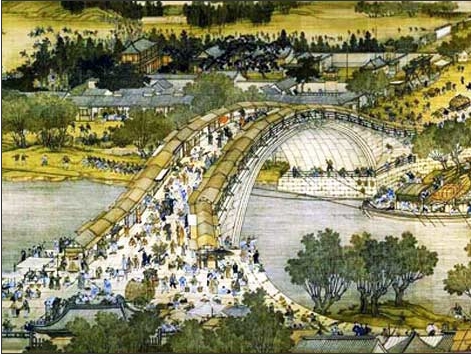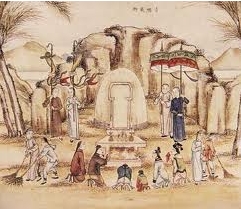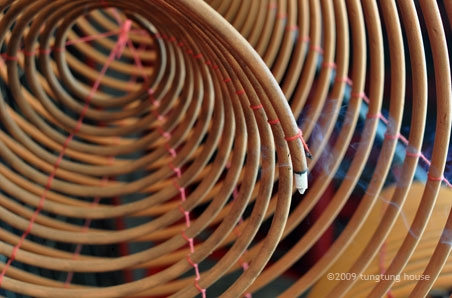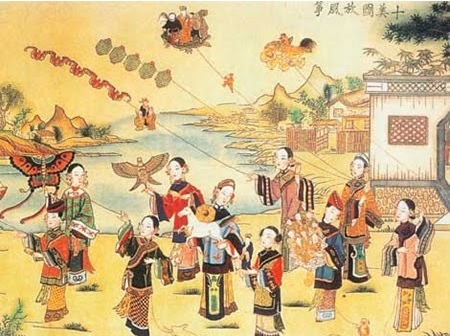
LOCATED in the northwest of Shanghai, Jiading District enjoys a deep historical and cultural heritage, as many historic sites and relics have been preserved here. Of all the different kinds of heritage, customs and traditions sometimes are even more treasured in people's daily lives.
In the early 1980s some cultural workers of Jiading District, who devoted themselves to protecting local customs and traditions, collected a group of folk stories about some Jiading-featured traditions. Those interesting stories are closely related to Jiading's folk custom and display the features of local folk arts. So this time, we pick some of the stories to share with you.
The lost tradition of tomb hanging

ON Tomb-sweeping Day (Qingming Festival) in the past, Jiading families used to hang bunches of paper looking like coins in different colors - white, pink, light blue - on the tombs of their ancestors.
At that time it was called "tomb hanging," and the tradition lasted until private tombs gradually disappeared.
The tradition started in the age of Zhu Yuanzhang, the first emperor of Ming Dynasty (1368-1644). Zhu was born into a poor family and became a monk in his childhood. His parents were buried with his neighbor's help after they passed away. Therefore, when Zhu ascended the throne, he decided to build a magnificent tomb for his parents.
However, Zhu was stumped when he tried to find the original tomb of his parents - he could not remember the scene very clearly as it had been too long since their burial.
Finally Zhu got an idea: if all the other people recognized their own tombs, the last one left would be his parents'.
Then, he used his imperial power and ordered all the people to put some marks on their own family tombs before the Tomb-sweeping Day. Anyone who disobeyed the order would be punished with crime of being unfilial.
The imperial edict was issued and the common people hurried to hang bunches of paper coins on their tombs. Zhu eventually found his parents' tomb, but the common people didn't know his true motive and still hung those marks every year, which gradually became a Tomb-sweeping Day tradition.
The lost tradition of burning Goushi joss sticks

EACH year on the 30th night of the seventh lunar month in ancient times, families in Nanxiang Town, Jiading District would burn joss sticks, which was called Dizang Joss Stick or Goushi Joss Stick, in their courtyards. But nowadays, this tradition is no longer followed.
Goushi has a similar pronunciation to Jiusi - the nickname of Zhang Shicheng, the leader of a farmer insurrectionary army at the end of the Yuan Dynasty (1271-1368). Actually, burning Goushi Joss Sticks is a way to commemorate him.
Zhang was a native of Baijuchang Town in Taizhou City, Jiangsu Province, and worked as a salt dealer. In 1353, he could no longer stand the oppressing officials and landlords and inspired a revolution. Since he was kind and often helped others, many salt workers supported him and his army soon occupied Taizhou, Xinghua and Gaoyou.
Gradually, Zhang occupied Jiangsu and Zhejiang provinces and claimed himself "King of Wu." Wherever Zhang reached, local people could live a safe and happy life. He was favored a lot by the residents on his land.
However, Zhang was defeated by Xu Da and Chang Yuchun, generals of Zhu Yuanzhang, the first emperor of the Ming Dynasty (1368-1644). He was escorted to Nanjing and hanged himself on the 30th day of the seventh lunar month.
Nanxiang people, like those in many other places, used to benefit from Zhang and missed him a lot. Therefore, they figured out a way of burning Goushi Joss Sticks to commemorate him.
Fortune lies beneath the surface of Qianmen Pond

QIANMEN Pond is located in Waigang Town in the west of Jiading District.
It is said that a long time ago, there lived a good young man in the rural area who sold bean curd in town every day to earn a living. The strangest thing was that two customers visited his booth every day, but never paid. They usually sat down at his booth in the early morning and had soybean milk, jellied bean curd and pot-stewed oil bean curd. After that, they would just leave without paying a penny. However, the young man never asked them to pay for the food, he even did not ask their names. Most people thought he was too tolerant.
One day, the two free riders felt ashamed of their conduct and asked the young man: "We come here every day and eat for free. Why don't you ask us to pay?"
The young man smiled and answered: "I know you two cannot afford it. Anyway, I can do business and I can still make a living, so it's okay."
The two men then said: "It's too hard for you to make bean curd here and sell it in town. It will not make you rich. Maybe we will find you a place to open a new shop, and you will become a millionaire definitely." However, the young man refused gently.
Some days later, the two men returned and invited the young man to visit their home. He followed them to the east, and eventually entered a reed marsh of Jiading.
The young man felt a strange sensation and noticed that the two other men had already disappeared. Suddenly he heard the sound of coins from the reeds marsh. It was just like a voice telling him to "come here and get rich."
He realized that he might have met some gods and recalled that the two men had tried to persuade him to relocate his stall. Finally he listened to their advice and opened a new bean curd shop near the reed marsh.
Since the young man heard the sound of coins in the reeds marsh, people nearby, especially the merchants, quickly gathered here and call it Qianming Pond, which means that the pond in which you can hear the sound of money. From that time on, the young man's shop gradually grew bigger and bigger, and at last he became a rich man.
Since ming is pronounced similar to men in the Jiading dialect, the name eventually became the current Qianmen Pond.





